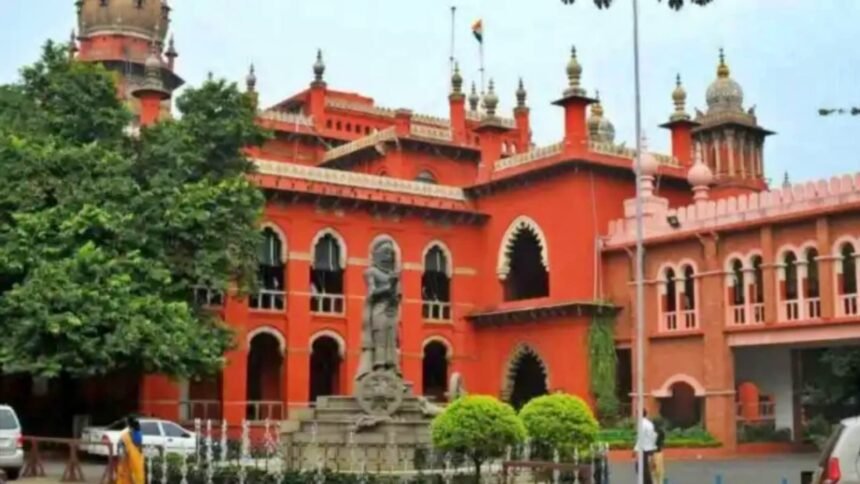In a move that has set legal circles in Tamil Nadu abuzz, Justice G R Swaminathan of the Madras High Court’s Madurai Bench issued a contempt warning and lashed out at Advocate S Vanchinathan — while presiding over a case in which Justice Swaminathan was the subject of a complaint sent by the same lawyer to the Chief Justice of India, alleging caste bias and ideological misconduct.
The July 24 hearing, part of a routine writ appeal, took a turn when Justice Swaminathan, seated alongside Justice K Rajasekar, summoned Vanchinathan to appear in person. The summons was not related to the appeal in question, but to confront the lawyer about a detailed representation he had submitted to the CJI, calling for an inquiry into what he alleged was caste-based favouritism and ideological partisanship in Justice Swaminathan’s courtroom conduct.
According to multiple accounts, the courtroom atmosphere was tense. According to those present, the judge questioned Vanchinathan on whether he stood by his allegations. When the advocate requested a written order before responding, Justice Swaminathan reportedly made a critical remark about him in open court.
The row
The row began when Vanchinathan, a practising lawyer and state coordinator of the People’s Rights Protection Centre, submitted a 38-page petition to the CJI in June 2025. The petition sought no punitive action against Justice Swaminathan, only an inquiry by the Chief Justice under the Supreme Court’s “in-house procedure” for judicial accountability — a system endorsed by the apex court in C Ravichandran Iyer Vs. Justice A M Bhattacharjee (1995), which holds that such complaints must be examined first by the Chief Justice, not the subject judge.
While hearing an untreated case on Thursday, Justice Swaminathan noticed Vanchinathan’s name as having earlier filed vakalat for one of the respondents. Although the lawyer had since returned the case papers, the judge summoned him to court the same day and questioned him in person.
When the advocate declined to verbally affirm or retract the petition without a formal query, the judge directed the Registry to issue a written questionnaire. In open court, the judge referred to Vanchinathan’s past suspension by the Bar Council and cited Supreme Court precedents to argue that the lawyer’s conduct amounted to criminal contempt.
Some pushback
On Saturday, eight retired judges — including Justice K Chandru and Justice D Hariparanthaman — issued a rare public appeal, asking Justice Swaminathan and Justice Rajasekar to step back from contempt proceedings. “In the absence of any action taken by the Chief Justice of India on the petition, it is premature for the learned judges to initiate action,” their joint letter read.
Story continues below this ad
The statement invoked the Ravichandran Iyer ruling, reiterating that judicial impropriety, if alleged, must be examined under a controlled and impartial framework — and not from the bench by the judge being accused.
This episode comes after the then Chief Justice D Y Chandrachud stated in November 2023 that contempt powers under Articles 129 and 215 of the Constitution exist “to safeguard the functioning of courts, not to shield judges from criticism.” He reiterated that fair criticism of judgments is permissible and vital in a constitutional democracy.
The rare appeal by retired judges of the Madras HC on Saturday further stated: “If and when the Chief Justice of India is of the opinion that it requires an investigation into the truthfulness or otherwise, he can constitute an ‘in-house inquiry’ into those allegations made against the judge.”
“It is only when the in-house committee is of the opinion that there is a prima facie truth in the allegations made, he can take or order appropriate action in the matter. This is the established procedure as of now. The same procedure has also been followed in the recent case of Justice Yashwant Varma of the Allahabad High Court,” said the appeal signed by retired judges Chandru, Hariparanthaman, C T Selvam, Akbar Ali, P Kalaiyarasan, S Vimala, K K Sasidharan and S S Sundar.
Story continues below this ad
The contempt order issued by Justices Swaminathan and Rajasekar said that Vanchinathan’s conduct prima facie constitutes criminal contempt of court. “We, therefore, persisted with our query as to whether he continued to maintain that one of us (Justice Swaminathan) is being casteist while discharging his judicial duties. S Vanchinathan refused to answer this question. Instead, he requested that the query be posed in writing,” the order said.
Vanchinathan has been asked to appear before the court at 1:15 pm on July 28 with a response to the question: “Whether you, S Vanchinathan, stand by your imputation of caste bias on the part of Justice G R Swaminathan in the discharge of his judicial duties?”







